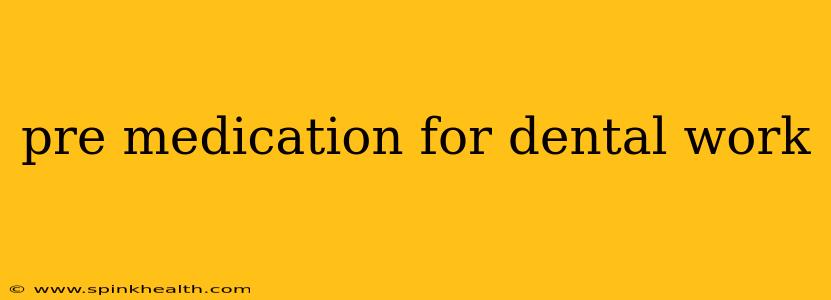Pre-Medication for Dental Work: Your Anxiety-Free Guide to a Healthy Smile
The whirring of the drill, the unfamiliar smells, the sheer anticipation – for many, a trip to the dentist can be a source of significant anxiety. This anxiety, often stemming from past negative experiences or a general fear of medical procedures, can make even routine dental work a daunting prospect. That's where pre-medication comes in. This isn't about drugging you into oblivion; it's about easing your nerves and making your dental experience as comfortable and stress-free as possible. This guide will explore the world of pre-medication for dental work, answering your questions and empowering you to have a positive dental visit.
What are the common types of pre-medication for dental anxiety?
This is a crucial question, and the answer depends entirely on your individual needs and the severity of your anxiety. Your dentist will conduct a thorough assessment to determine the best course of action. Common options include:
-
Oral Sedatives: These are pills you take before your appointment. They can range from mild anxiety reducers to stronger sedatives that induce a state of relaxation. The choice will be based on your specific anxiety level and medical history.
-
Nitrous Oxide ("Laughing Gas"): This is a mild sedative inhaled during your procedure. It helps to relax you and dull your senses, making the experience less stressful. The effects wear off quickly after the procedure, and you'll be able to drive yourself home (as long as your dentist confirms you're fit to do so).
-
IV Sedation: For those with severe dental anxiety, IV sedation offers a deeper level of relaxation. A sedative is administered intravenously, allowing for a more controlled and customized level of sedation. You'll likely be drowsy and may not remember much of the procedure. You will need someone to drive you home.
-
General Anesthesia: This is reserved for complex procedures or patients with extreme phobias. General anesthesia puts you into a complete state of unconsciousness for the duration of the procedure. You'll need a designated driver and likely a post-operative recovery period.
What are the risks associated with pre-medication?
While pre-medication is generally safe and effective, potential risks exist. These vary depending on the type of medication and your individual health. It's crucial to discuss your medical history, including any allergies or pre-existing conditions, with your dentist and their medical team. They'll assess your suitability for pre-medication and discuss any potential risks or side effects in detail. Common side effects can include drowsiness, nausea, and dizziness.
How do I prepare for pre-medication?
Your dentist will provide specific instructions, but general guidelines include:
-
Fasting: You might need to fast for a certain period before your appointment, especially if you're receiving IV sedation or general anesthesia. This is to prevent complications during the procedure.
-
Medication Disclosure: Be completely transparent about all medications you're currently taking, including over-the-counter drugs and supplements. This information is vital for your safety.
-
Transportation: Arrange for someone to drive you home if you're receiving anything beyond nitrous oxide. Never drive yourself home after receiving sedation or anesthesia.
Does insurance cover the cost of pre-medication for dental work?
Insurance coverage for pre-medication varies widely depending on your plan and the type of sedation used. It's best to contact your insurance provider directly to inquire about coverage details before your appointment. Some plans cover routine sedation, while others may require pre-authorization for more extensive options like IV sedation or general anesthesia.
Can I take my own anxiety medication before my appointment?
Never take any medication before your dental appointment without explicitly discussing it with your dentist. Interactions between your medication and the dental sedatives can be dangerous. Always prioritize open communication with your dentist and follow their guidance to ensure your safety and a comfortable experience.
What should I expect after pre-medication?
The recovery period will depend on the type of sedation used. After nitrous oxide, the effects wear off quickly. With IV sedation or general anesthesia, you'll likely experience drowsiness and potentially some nausea. Your dentist will provide you with specific post-operative instructions and advice.
Remember, your comfort and well-being are paramount. Open communication with your dentist is key to a positive and anxiety-free dental experience. Don't hesitate to voice your concerns; they're there to help you achieve a healthy and confident smile.

